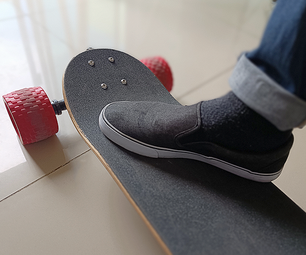Introduction: Paddleboat Using Recycled Materials
A friend who runs a maker summer camp contacted me a few weeks ago to see if I would be up for doing some welding at her camp. When I found out the details, I was definitely up for it: help some kids build a human-powered paddle boat out of recycled materials!
Step 1: Finding Materials
The first step was to find materials. We lucked out, because it was bulky trash pickup week in her neighborhood and someone a few blocks away was throwing away a bunch of plastic water bottles.
For the deck, we scavenged some 3/4" plywood. No my first choice, but the guys wanted to be sure it was REALLY sturdy!
We decided to make the water bottles into two crude pontoons by duct taping them to boards and strapping them to the deck.
Step 2: Attaching the Pontoons
Next, we attached the pontoons to the raft by drilling four pairs of 3/4 holes for ratcheting straps to go through. We threaded a strap through the front and one through the back, and our boat was made!
Step 3: Building the Paddle Mechanism
Building the paddle mechanism was a bit of a head scratcher until I saw this helpful video:
Inspired by their clever use of a bike frame, we scavenged an old bike frame, a 16" steel bike wheel, and an old bed frame to cut up for angle iron.
We cut the main tube and down tube off the frame, leaving the rear triangle intact. Then we flipped it upside down and screwed it down to the back of the boat.
Step 4: Welding the Paddle Wheel
We revised the wheel design a bit by welding a 6" bolt to the axle to extend and give us more room for the paddles. Next we cut up the bed frame into 5" pieces to be paddle supports, and cut two 30" lengths to be the frame for the wheel. After welding the paddle supports in place and drilling some holes, we put it all together.
Step 5: Finishing Touches
After mounting the paddle wheel to the boat and checking for paddle clearance, we unscrewed the bike frame from the deck and re-positioned it so the gears lined up. Then we added the long chain--already available from a previous camp project--and tried it out. It worked great!
We determined where the pilot would sit and screwed down a simple backrest with a camp seat on the top to finish it off. After checking for sharp edges or screws sticking out, it was ready for the water!
Step 6: Can't Touch This!
On the last day of camp, we hauled the boats to the water for a floating scavenger hunt. Our boat, Can't Touch This!, easily strapped to my roof rack and made it safely to the water. And the paddle mechanism did not disappoint--our boat was the snappiest one out there.
Reflection: This boat is crude, and was built at a camp for just a few minutes of use at the end of the week. However, enough things came together during the construction that I keep thinking about it weeks later. It really was the most fun week of camp I've ever had a hand in and the boys who helped build it were very plugged in! The boat is pure joy to peddle and the only new materials in it are a handful of screws and some duct tape. If I were to make a v.II, I'd go with a lighter deck and maybe streamline the pontoons with some plastic sheeting. I can't wait to hear how else it could be improved.

Participated in the
squeeze more awesome out of summer contest

Participated in the
Great Outdoors Contest












